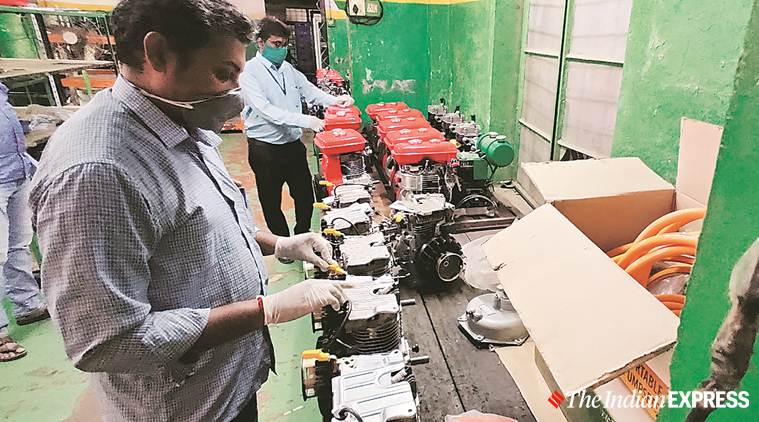‘Essential service, but how do we meet demand without supplies?’
While the Union Home Ministry has issued a clarification, the threat of facing penalty should any of their workers test positive for COVID-19 is stopping many units from starting work, he says.
 With masks, gloves and social distancing, work goes on at the manufacturing unit in Chennai. (Express photo)
With masks, gloves and social distancing, work goes on at the manufacturing unit in Chennai. (Express photo)
Southern Agro Engine Pvt Ltd
Guindy Industrial Estate, Chennai
No. of workers: 20
Usual strength: 80
AS A MANUFACTURER of sprayers usually used for agricultural works but now being deployed for coronavirus disinfecting drives, Jayavijayan Dayalan’s Southern Agro Engine Pvt Ltd falls under the category of “essential services”. That, Dayalan says, means little.
With his suppliers yet to start operations, the 46-year-old says he has deployed no more than 20 workers as he can’t meet the demand.
While the Union Home Ministry has issued a clarification, the threat of facing penalty should any of their workers test positive for COVID-19 is stopping many units from starting work, he says.
When the lockdown started on March 25, Dayalan’s factory, like most other units at the Guindy Industrial Estate, shut for a week. “Then there was huge pressure from government agencies for our products. We had to step in, we mobilised workers and opened our units to supply the products we already had ready,” he says. Southern Agro manufactures a range of sprayers, including those that run on batteries, on high-power engines, and even those mounted on wheels, apart from power weeders and tillers, for an annual turnover of around Rs 55 crore.
The first task was retaining the labourers. “Some 10% of them are from northern states like Bihar and Mizoram. Others are from Chennai and neighbouring districts.” While around 10 were already home before the lockdown started, others subsequently went to stay with relatives. Dayalan then organised accommodation for 10 workers next to his factory and another 30 at a unit owned by his father nearby.
“We have provided them ration, kerosene and all essential facilities. A local canteen brings food during work hours,” he says.
Located towards one end of Chennai, the Guindy Industrial Estate has over 1,000 MSME units. A majority, except those making medicines or food products, are shut. Those open are struggling like Southern Agro.
Murali D, 40, who has been working at Southern Agro for six years and now holds the rank of manager, travels to work from his home in Chennai. He has a pass for his motorcycle. However, he remains in fear for his family. “I deal with no less than 50 people every day, including clients. When I get home, I go straight to the bathroom. I eat alone, sleep in the hall,” says Murali, who ensures all workers wear gloves and masks while at work.
Surya Narayanan, a frail worker in his late 50s, stays with 15 others at the accommodation arranged by the company. The premises are spacious, with rooms holding two-three people. However, as soon as the lockdown is lifted, Surya Narayanan hopes to visit home in Andhra Pradesh.
In good times, Southern Agro would have 200 employees on rolls, with 80 people working at any time from 9 am till 5.30 pm, putting in extra hours during the peak farming periods of May-July and December-February.
However, things have been sliding for a while. First, the 2015 Chennai floods hit Dayalan’s business, with his factory almost submerged in water. Demonetisation and GST dealt further blows.
This could have been boom time. Dayalan says among customers seeking his products these days are corporate firms and contractors in-charge of disinfecting drives in city corporation zones, as well as his usual customers. Chennai City Corporation alone has acquired over 300 sprayers in the past three weeks. “The demand is increasing daily, but we cannot manufacture any more without a favourable environment,” he says, again mentioning the fear of attracting an FIR.
“We have masks, gloves, hand sanitisers, everything. We are following all the guidelines, but still I fear I will be in trouble if somebody gets the infection.”
Dayalan says his business is also constrained by the fact that they depend on China for spare parts, and supply has stopped. Southern Agro has two patents and his father’s unit manufactures some parts. “But nobody here can compete with China’s prices,” Dayalan says, adding the government should incentivise them.
With 20 on rolls, whom he pays between Rs 10,000 and Rs 1 lakh, Dayalan fears he won’t be able to manage even next month’s wages. “I do not know for how long I can pay without any production.”
While he hopes the Home Ministry’s clarification will help, Dayalan adds, “Industries work in a very complex manner, nobody can work alone without another factory supplying and another unit buying things. This clarification is helpful but the outcome, whether people take it seriously or remain confused, we will know only after a week.”







